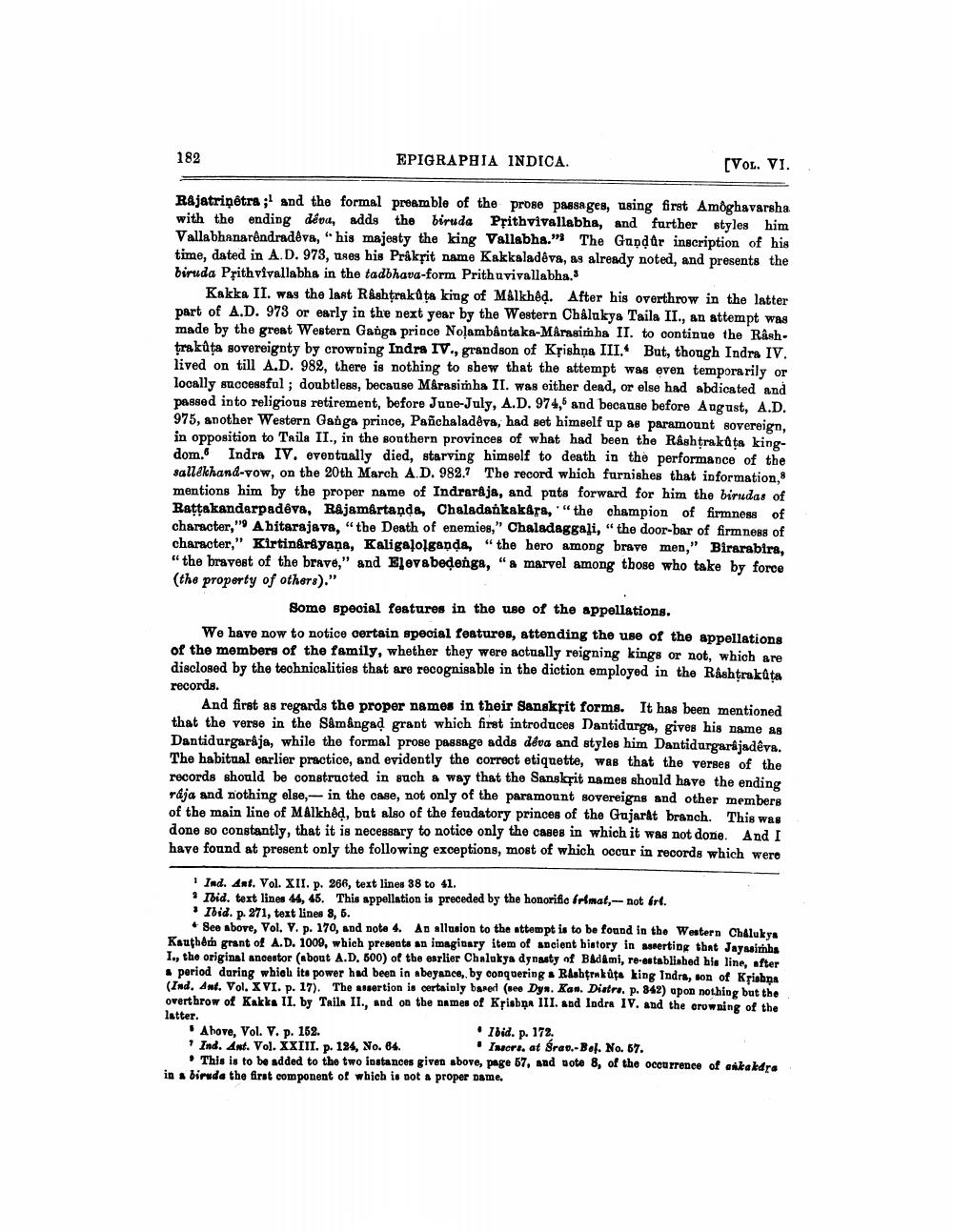________________
182
EPIGRAPHIA INDICA.
[VOL. VI.
Rajatrinetra;' and the formal preamble of the prose passages, using first Amoghavarsha with the ending dévu, adds the biruda Pfithvivallabha, and further styles him Vallabhanarendradêva, "his majesty the king Vallabha." The Gapdør inscription of his time, dated in A.D. 973, uses his Prakṣit name Kakkaladeva, as already noted, and presents the biruda Prithvivallabha in the tadbhava-form Prithuvivallabhs.
Kakka II. was the last R&shtrakata king of Malkhôd. After his overthrow in the latter part of A.D. 973 or early in the next year by the Western Chalukya Taila II., an attempt was made by the great Western Ganga prince Nolambântaka-Marasimha II. to continue the Rashtrakta sovereignty by crowding Indra IV., grandson of Krishna III. But, though Indrs IV. lived on till A.D. 982, there is nothing to shew that the attempt was even temporarily or locally successful; doubtless, because Mårasimha II. was either dead, or else had abdicated and passed into religious retirement, before June-July, A.D. 974, and because before August, A.D. 975, another Western Ganga prince, Panchaladeva, had set himself up as paramount sovereign, in opposition to Taila II., in the southern provinces of what had been the Rashtrakata kingdom. Indra IV. eventually died, starving himself to death in the performance of the sallakhand-vow, on the 20th March A.D. 982.7 The record which furnishes that information, mentions him by the proper name of Indraraja, and puts forward for him the birudas of Rattakandarpadeva, Rajamärtaņda, Chaladankakare,'"the champion of firmness of character," Ahitarajava, "the Death of enemies," Chaladaggali, " the door-bar of firmness of character," Kirtinarayana, Kaligaļolganda, “the hero among brave men," Birarabira, " the bravest of the brave," and Elevabedenga, "a marvel among those who take by force (the property of others)."
Some special features in the use of the appellations. We have now to notice certain special features, attending the use of the appellations of the members of the family, whether they were actually reigning kings or not, which are disclosed by the technicalities that are recognisable in the diction employed in the Rashtrakata records.
And first as regards the proper names in their Sanskrit forms. It has been mentioned that the verse in the Sámångad grant which first introduces Dantidurga, gives his name as Dantidurgarája, while the formal prose passage adds dåva and styles him Dantidurgarajadêva. The habitual earlier practice, and evidently the correct etiquette, was that the verses of the records should be constructed in such a way that the Sanskřit names should have the ending rája and nothing else, - in the case, not only of the paramount sovereigns and other members of the main line of MAlkhôd, but also of the feudatory princes of the Gujarat branch. This was done so constantly, that it is necessary to notice only the cases in which it was not done. And I have found at present only the following exceptions, most of which occur in records which were
Ind. Arf. Vol. XII. p. 266, text lines 38 to 41. Ibid. text lines 44, 46. This appellation is preceded by the honorific frimat -- not brl.
Ibid. p. 271, text lines 8, 6.
• See above, Vol. V. p. 170, and note 4. An allusion to the attempt is to be found in the Western Chalukya Kauthóth grant of A.D. 1009, which presents an imaginary item of ancient history in asserting that Jayasimhs I., the original ancestor (about A.D. 500) of the earlier Chalakya dynasty of Badami, re-established his line, after
period during which its power had been in abeyance, by conquering Rashtrakufa king Indrs, son of Krishna (Ind. Ant. Vol. XVI. p. 17). The assertion is certainly barel (see Dyr. Kan. Distr. p. 842) apon nothing but the overthrow of Kakks II. by Taila II., and on the names of Krisbp III. and Indra IV. and the crowning of the latter. Ahove, Vol. V. p. 152.
Ibid. p. 172. Ind. Ant. Vol. XXIII. p. 124, No. 64.
Imeri, at Sres.-Bel. No. 67. . This is to be added to the two instances given above, page 67, and note 8, of the occurrence of eskadra in a bir de the first component of which is not a proper Dame.




